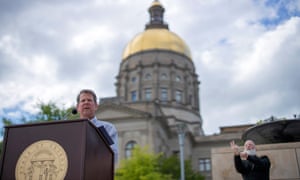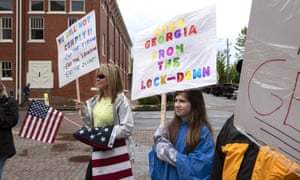Georgia's Covid-19 reopening pits white governor against black mayors
African Americans account for 54% of state’s known Covid-19 deaths while Atlanta’s mayor unveils her own reopening council

On Monday, Georgia’s governor, Brian Kemp, announced his decision to reopen the state for business.
Non-essential businesses, including tattoo parlors, hair salons, movie theaters and bowling alleys, will be authorized to reopen from Friday, if they follow social distancing orders.
In a state where African Americans make up more than 32% of the population but account for an estimated 54% of known coronavirus deaths, the decision pitted a white Republican governor against mostly black Democratic mayors and critics.
“By trying to push a false opening of the economy, we risk putting more lives in danger,” Stacey Abrams, the Democrat who lost to Kemp in a controversial election in 2018, told MSNBC.
Citing the close contact needed for grooming services, Abrams said: “There is nothing about [the measure] that makes sense.”
Abrams also said the governor “did not consult with [the mayors] before making this decision”.

The mayors of Savannah, Augusta and Atlanta confirmed they were not contacted before the governor’s announcement.
Bo Dorough, who is white, is the mayor of Albany, a small city with a cluster of confirmed Covid-19 cases that has ravaged its mostly black community. Dorough said he only learned of the Kemp’s announcement after an aide caught the press conference on TV.
“I’m flabbergasted that the governor would say we can’t take additional precautions to protect our citizens,” Dorough told the Atlanta Journal-Constitution. “This isn’t a mixed signal. It’s a U-turn.”
Citing “more than 19,000 Georgians” who have tested positive for coronavirus, Atlanta’s mayor, Keisha Lance Bottoms, who is black, said in a statement she “will continue to urge Atlanta to stay at home, stay safe and make decisions based on the best interests of their families”.
She later told CNN: “As a parent, I am concerned. Our numbers are going up. [Mayors] are really at a loss.”
On Monday, Bottoms unveiled her own advisory council for reopening, independent of state guidance.

African Americans face a higher risk of exposure to the virus, mostly on account of their living in urban areas and being employed in essential industries. Only 20% of black workers reported being eligible to work from home, compared with about 30% of their white counterparts, according to the Economic Policy Institute.
Institutional healthcare inequities exacerbate the death rate. Cuts to Medicaid and Medicare, facility closures and caps on public health insurance plans make African Americans twice as likely to lack health insurance compared with their white counterparts.
Georgia, the US’s eighth largest state, has one of the highest numbers of confirmed cases in its region. More than 700 people have died; the state has one of the slowest testing rates.
Data from Johns Hopkins University showed that cases in Georgia more than doubled in less than two weeks, from 7,300 on 6 April to just over 18,000 by Sunday.
Abrams said ordering businesses to reopen would therefore put Georgia’s communities at risk.
“These businesses that are reopening are going to force frontline workers back to work without having been tested, without having access to a healthcare system to help them if they are in need,” she said.
The US south presents the “perfect storm of characteristics to just be a tragic region in terms of the Covid outbreak”, said Thomas LaVeist, dean of public health and tropical medicine at Tulane University.
Kemp acknowledged the possible consequences of his reopening order.
“When we have more people moving around we’re probably going to see cases continue to go up,” he said. “But we’re a lot better prepared for that now than a month ago.”
Kemp denied accusations that his reopening order was a coordinated move in support of Donald Trump, who has expressed support for rightwing demands to reopen states for business.
“I don’t give a damn about politics right now,” Kemp said.
For much of the outbreak, Georgia did not know the race of some residents tested for the coronavirus, as drive-thru testing sites were not collecting that data.
A Journal-Constitution investigation found that the state left race off of its own testing registration form. The error was only corrected after the paper informed the state department of public health.
The race or ethnicity of more than 45% of Georgia coronavirus cases remains unknown. Of those cases the state has tracked, African Americans make up 27% of positive coronavirus cases and 54% of all deaths, more than any other racial or ethnic group.“
No comments:
Post a Comment